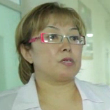Antonina Savina says she knew she wanted to have her second baby at Astana’s City Perinatal Center #1. And when the baby, Anastasia, was born at 35 weeks, she knew she’d chosen well. “All the doctors and nurses were very helpful, very human. They helped swaddle the baby, that’s important because the baby was premature.”
With support from the World Bank, Kazakhstan is improving the efficiency and quality of its health system. The Ministry of Health is working to bring Kazakhstan in line with international standards for safety and quality of health services.
At the City Polyclinic #7, doctors and nurses sew up a cut hand and, upstairs, do a stress test. In order to apply to get accreditation based on upgraded facility standards, developed as part of the World Bank funded project, this clinic has gotten new equipment, and training on patient flow management.



